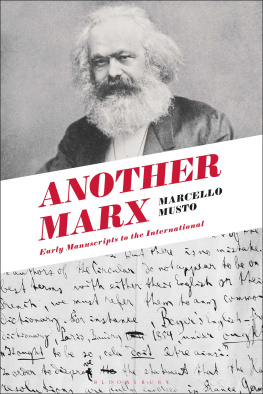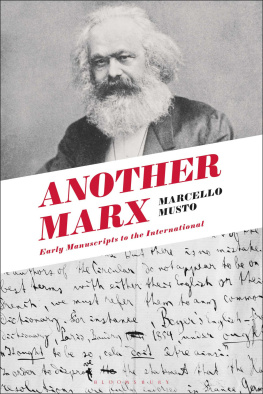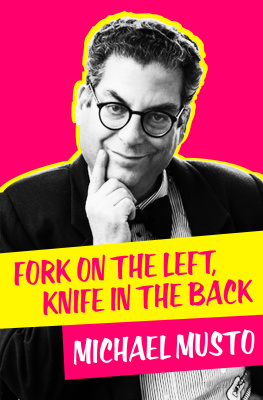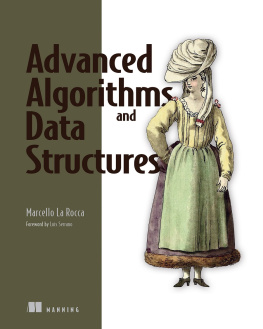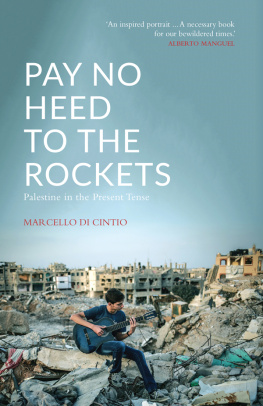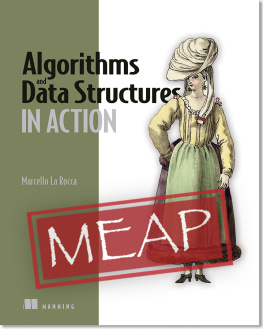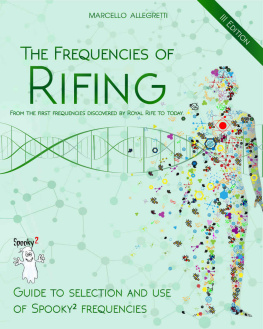Marcello Musto - Another Marx
Here you can read online Marcello Musto - Another Marx full text of the book (entire story) in english for free. Download pdf and epub, get meaning, cover and reviews about this ebook. year: 2018, publisher: Bloomsbury UK, genre: Romance novel. Description of the work, (preface) as well as reviews are available. Best literature library LitArk.com created for fans of good reading and offers a wide selection of genres:
Romance novel
Science fiction
Adventure
Detective
Science
History
Home and family
Prose
Art
Politics
Computer
Non-fiction
Religion
Business
Children
Humor
Choose a favorite category and find really read worthwhile books. Enjoy immersion in the world of imagination, feel the emotions of the characters or learn something new for yourself, make an fascinating discovery.
- Book:Another Marx
- Author:
- Publisher:Bloomsbury UK
- Genre:
- Year:2018
- Rating:4 / 5
- Favourites:Add to favourites
- Your mark:
- 80
- 1
- 2
- 3
- 4
- 5
Another Marx: summary, description and annotation
We offer to read an annotation, description, summary or preface (depends on what the author of the book "Another Marx" wrote himself). If you haven't found the necessary information about the book — write in the comments, we will try to find it.
Another Marx — read online for free the complete book (whole text) full work
Below is the text of the book, divided by pages. System saving the place of the last page read, allows you to conveniently read the book "Another Marx" online for free, without having to search again every time where you left off. Put a bookmark, and you can go to the page where you finished reading at any time.
Font size:
Interval:
Bookmark:

Also available from Bloomsbury
Aesthetic Marx, edited by Samir Gandesha and Johan Hartle
Capitalism: The Reemergence of a Historical Concept, edited by
Jrgen Kocka and Marcel van der Linden
Workers Unite! The International 150 Years Later, edited by
Marcello Musto

To George and Ann,
for their warm hospitality,
unconditional help, boundless support,
and most of all infinite patience.
Some of the chapters included in this volume are based, in whole or in part, on articles published in scholarly journals and chapters in books. However, they were initially conceived as components of a larger work.
Chapter 2 is a thoroughly revised and extended version of Marx in Paris: Manuscripts and Notebooks of 1844, Science & Society, vol. 73 (2009), n. 3, pp. 386402.
Chapter 3 is a revised version of The Formation of Marxs Critique of Political Economy: From the Studies of 1843 to the Grundrisse, Socialism and Democracy, vol. 24 (2010), n. 2, pp. 66100.
Chapter 4 is a revised and extended version of Marxs life at the time of the Grundrisse. Biographical Notes on 18578, in Marcello Musto (ed.), Karl Marxs Grundrisse: Foundations of the Critique of Political Economy 150 Years Later, Routledge, 2008, pp. 14761.
Chapter 6 is an extended version of The Writing of Capital: Genesis and Structure of Marxs Critique of Political Economy, Critique, vol. 46 (2018), no. 1, pp. 1126.
Finally, chapters 7, 8 and 9 are based on the Introduction to the anthology Marcello Musto (ed.), Workers Unite! The International 150 Years Later, Bloomsbury, 2014, pp. 168.
The permission to partially reappear in this book is gratefully acknowledged.
Marxs writings have been generally quoted from the 50-volume Marx Engels Collected Works (MECW), Moscow/London/New York: Progress Publishers/Lawrence and Wishart/International Publishers, 19752005. Sometimes the translations have been modified to conform more closely to the original German. Citations from the Grundrisse have been taken from the 1973 Penguin edition translated by Martin Nicolaus, while Marxs addresses, resolutions and speeches from the period of the International Working Mens Association have been quoted from Marcello Musto (ed.), Workers Unite! The International 150 Years Later, Bloomsbury, 2014. Moreover, in a few cases the reader is referred to single works translated into English but not included in MECW.
Texts that have not yet been translated into English are referenced to the Marx-Engels-Gesamtausgabe (MEGA2), Berlin: Dietz/Akademie/De Gruyter, 1975, of which 65 of the originally planned 114 volumes have so far appeared in print.
As regards the secondary literature, quotations from books and articles not published in English have been translated for the present volume.
All the names of journals and newspapers have been indicated first in the original language, followed by an English translation in square brackets.
Indications of birth and death dates of authors and historical figures have been provided the first time they are mentioned in the book.
I would like to express my most sincere gratitude to Patrick Camiller, who, during the past ten years that we have been working together, has always translated my works with the highest competence, comradely commitment and enormous patience for my many requests. Every author dreams to collaborate with a competent translator; only few, though, have the luck of having one who knows more than they do. Thanks to Patrick, and to his vast knowledge of politics, philosophy and history, I belong to the lucky circle of the latter.
The author would like to thank the Faculty of Liberal Arts & Professional Studies, York University, Toronto, Canada, for the financial support it provided to this work.
If an authors eternal youth consists in his capacity to keep stimulating new ideas, then it may be said that Karl Marx has without question remained young.
He has even been back in fashion since the outbreak, in 2008, of the latest crisis of capitalism. Contrary to the predictions after the fall of the Berlin wall, when he was consigned to perpetual oblivion, Marxs ideas are once more the object of analysis, development and debate. Many have begun to ask new questions about a thinker who was often falsely identified with actually existing socialism and then curtly brushed aside after 1989.
Prestigious newspapers and journals with a wide audience of readers have described Marx as a highly topical and far-sighted theorist. Almost everywhere, he is now the theme of university courses and international conferences. His writings, reprinted or brought out in new editions, have reappeared on bookshop shelves, and the study of his work, after more than twenty years of neglect, has gathered increasing momentum, sometimes producing important, ground-breaking results. Of particular value for an overall reassessment of Marxs work was the resumed publication in 1998 of the Marx-Engels-Gesamtausgabe (MEGA2), the historical-critical edition of the complete works of Marx and Engels.
The dissemination of their oeuvre is a long and tortuous story. After Marxs death, in 1883, Friedrich Engels [18201895] was the first to dedicate himself to the very difficult task because the material was dispersed, the language obscure and the handwriting illegible of editing his friends legacy. His work concentrated on the reconstruction and selection of original materials, the publication of unpublished or incomplete texts, and the republication or translation of work that had already appeared in print. His priority was the completion of Capital, of which Marx had published only Volume I in his lifetime.
Two years after Engelss death, in 1897, the Italian socialist Antonio Labriola [18431904] asked: Were the writings of Marx and Engels [] ever read in their entirety by anyone outside of the group of close friends and disciples [] of the authors themselves? His conclusions were unequivocal: Up to now, it seems to have been a privilege of initiates to read all the writings of the founders of scientific socialism; the propagation of historical materialism had involved endless equivocations, misunderstandings, grotesque alterations, strange disguises and unfounded inventions. More than 120 years later, this ambition has still not been realized.
After the death of Engels, the natural executor of the complete works of Marx and Engels was the None of its theoreticians bothered to compile a list of their writings, or even methodically to collect their voluminous correspondence that was such a valuable source of clarification, sometimes even expansion, of their thought.
The first attempt to publish the complete works of Marx and Engels, the Marx-Engels-Gesamtausgabe (MEGA), was made only in the 1920s, in the Soviet Union, thanks mainly to the tireless initiative of David Ryazanov [18701938]. In the early 1930s, however, Stalinist purges struck at the main scholars engaged in the edition, and the advent of Nazism in Germany abruptly curtailed further work.
The project of a second MEGA, designed to reproduce all the writings of the two thinkers together with an extensive critical apparatus, got under way in 1975 in East Germany. Following the fall of the Berlin wall, however, this too was interrupted. A difficult period of reorganization ensued, in which new editorial principles were developed and approved, and the publication of MEGA2 recommenced only in 1998. Since then twenty-six volumes have appeared in print others are in the course of preparation containing new versions of certain of Marxs works; all the preparatory manuscripts of
Next pageFont size:
Interval:
Bookmark:
Similar books «Another Marx»
Look at similar books to Another Marx. We have selected literature similar in name and meaning in the hope of providing readers with more options to find new, interesting, not yet read works.
Discussion, reviews of the book Another Marx and just readers' own opinions. Leave your comments, write what you think about the work, its meaning or the main characters. Specify what exactly you liked and what you didn't like, and why you think so.

